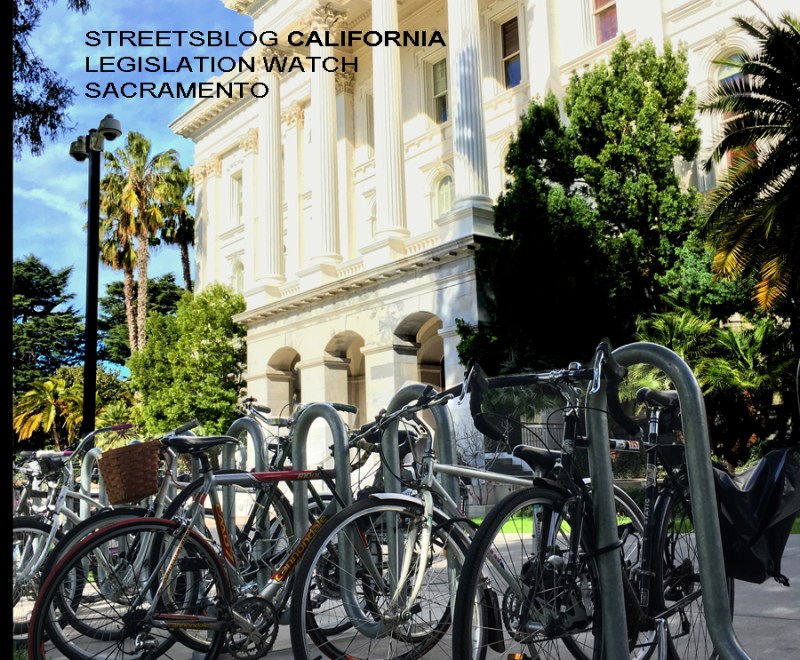Now that the deadline for submitting bills for the current California legislative session has passed, it's possible to get somewhat of an idea what lawmakers are working on. The next couple of posts will take a quick look at some of the ones that stand out (and may be most likely to pass, in one form or another).
Note that it's very early in the process, and these bills have not yet had any public hearings. They are very likely to be amended at least somewhat as people weigh in. If you have strong opinions about any of these issues, it's worth sending comments to the authors, or commenting at the public hearings. Information about how to do so can be found at the Senate and Assembly websites.
Several of these bills are second tries that for whatever reason did not pass in an earlier session, and they could all benefit from public support.
Traffic Safety
Assemblymember Laura Friedman is back with a bill on setting speed limits. This time around, the bill has several coauthors, and Friedman is now also the chair of the Assembly Transportation Committee. A.B. 43 will try to codify some of the recommendations from the Zero Fatalities Task Force, which was formed as a result of her previous bill. Right now, the bill is worded to make some minor changes to the Highway Design Manual and calls for Caltrans to track bicycle and pedestrian crashes. Friedman has said that her goal is to find a way to compel cities to use design changes to lower speeds, but hasn't said specifically how that would be handled.
Stops as Yields
Assemblymember Tasha Boerner Horvath has two bills about bikes, and the first is A.B. 122, which would allow bicycle riders to treat stop signs as yield signs. This is the second try in California on this topic; the last was a bipartisan bill that faced such strenuous opposition that the authors pulled it.
This time around may be different. Since 2018, when A.B. 1103 was dropped, several more states have adopted similar laws, so it can no longer accurately be called the "Idaho Stop." Delaware adopted the "Delaware Yield" law in October 2017, and a study produced by that state showed a remarkable decrease (23 percent) in bike crashes at stop-sign controlled intersections after the law passed. The study authors theorize that this is because treating stop signs as yield signs allows bicycle riders to both increase their visibility and decrease their exposure to risk at intersections.
Four other states have adopted some version of a "stop-as-yield" law: Arkansas, Colorado, Oregon, and Washington. Colorado adopted an "opt-in" version, and is currently working on making it a statewide standard. Virginia, New Jersey, New York, North Dakota, Oklahoma, and Utah are all somewhere in the process of exploring it - the Virginia legislature just defeated a bill to allow it, but has called for study on the issue.
It's intuitive for many people on bikes, but sometimes it can take some explanation to get drivers to understand why bike riders behave this way, and why it can be safer for them to do so.
E-bike Rebates
Assemblymember Boerner Horvath is also the author of A.B. 117, which would create a statewide program to offer rebates for people who buy e-bikes. As currently written, it would use $10 million from cap-and-trade (the Greenhouse Gas Reduction Fund) for the Electric Bicycle Rebate Pilot Project under the Clean Vehicle Rebate program at the Air Resources Board.
This is different from the e-bike incentives currently offered in the Bay Area under the Clean Cars for All program, which is a cash-for-clunkers program specifically aimed at low-income communities. It's also separate from a recently introduced federal bill that would offer tax credits for e-bike purchases.
As part of the Clean Vehicle Rebate program, it would face scrutiny to make sure the money goes to people who need it, which is appropriate. While $10 million may seem like a lot, California has spent a lot more than that helping people buy electric cars, including Teslas. E-bikes have the potential to be much more transformative than a car, both to people's lives as well as for the environment - and traffic congestion.
Once people try e-bikes, they see how an electric bicycle can make biking easier in general, as well as making longer or hillier trips easier. And they find they make good substitutes for many car trips. (There's a program in Santa Barbara that allows residents to test out different types of e-bikes for an hour or a few days to see what kind of bike would suit them best. This idea should be copied all over the state.)
The California Bicycle Coalition has a petition, here, to show support for e-bike rebates.
Safe Streets
Assemblymember Adrin Nazarian has a bill, A.B. 773, that would allow local authorities to close streets and designate them as "slow streets." Since cities all over California have been doing this - to varying levels success - throughout the pandemic, it's not clear exactly what the problem is this bill is addressing. More info to come.
Next: Bills on transit, housing, environmental justice, and wonky planning stuff.
Follow Streetsblog California on Twitter @StreetsblogCal






